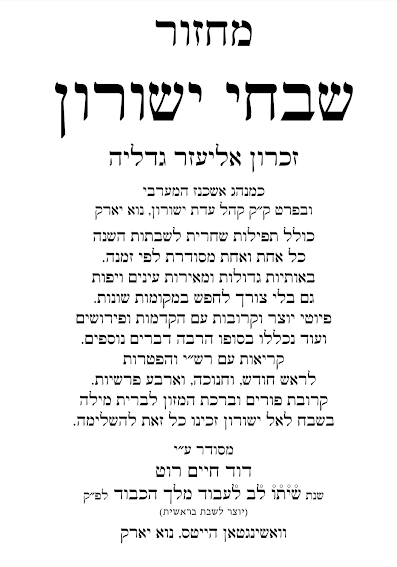Your archivist here, Beth Kanell (née Elizabeth Lancy Minden; my father is Walter Minden, whose father is Ernst/Ernest Minden, whose father is Max Minden), has now invested more time in learning about Jewish tradition and practice, and some Hebrew. So, with apologies for taking so long to learn enough to be able to present this properly ... here is information on the significant Machzor established by Rav Dovid Roth (his mother is Judi Roth, whose mother is Ruth Novice, whose father is Henry Minden, whose father is Max Minden).
Rav Roth and his team prepared a compendium and assessment of prayer rooted in the Ashkenaz tradition, as practiced particularly at the congregation K'hal Adath Jeshrun in Washington Heights, New York City. Containing all the piyutim for each Shabbos, the book sets these into perspective in the German Jewish tradition and history.
The book is presented in Hebrew, with some annotations in English.
For an appreciation of the work as described in the publication Cross-Currents, click here; a portion of this review states:
The latest such work is Machzor Shivchei Yeshurun, which features a complete, year-round selection of Western Ashkenazic piyyutim, with rich, historical background and thematic commentary, as well as halachic insights and explanations of various minhagim. This exquisite work, co-published by Goldschmidt Basel AG/Rodelheim, is the product of Rabbi Dovid Roth, along with his team of experts, and it carries the important approbations of Rabbi Binyamin Shlomo Hamburger, who heads Machon Moreshes Ashkenaz, and Rabbi Arie Folger, whose masterful Western European rabbinic leadership is accompanied by his vast and intense knowledge of that region’s liturgy and customs. Each of the approbations is a detailed and elaborate essay about the origins and halachic significance of piyyutim – each a unique must-read piece. (I also urge readers to consult Rav Soloveitchik’s discussion of piyyutim on pages 76-77 here, and elsewhere.)
Rabbi Roth himself states:
This sefer describes the meaning of piyutim recited by many Western Ashkenazic (German and Dutch) communities in pre-War Europe, and still maintained in a few communities today. Each piyut is elucidated by insights and explanations of the meaning of the piyut.
The piyutim recited for each Shabbos are clearly defined and integrated with the appropriate tefillos, eliminating the need to flip back and forth between siddur and piyutim sefer.
It is hoped that this sefer will enhance the davener's understanding of the beauty and depth of these piyutim, many of which have fallen by the wayside as people have not understood what they represent. Since minhagim vary among communities, we have maintained full compatibility with virtually all Western Ashkenaz minhagim, with a special focus on K’hal Adath Jeshurun of Washington Heights.
To learn more or order a copy, for your Minden Archives and perhaps for study, use this website: https://sites.google.com/site/shivcheiyeshurun
Yasher koach, cousin Dovid, for this work that adds to both preservation and understanding, in a form accessible for those wishing to continue the use of these prayers.


